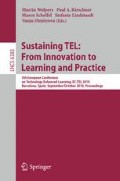Abstract
In this paper, we study the issue of free-riding in collaborative learning. Free-riding occurs when a part of the students lean on the efforts of the rest of their team and do not contribute much to the team work. It impacts negatively on performances of the whole team [1]. We present an experiment of collaborative diagram drawing (through a synchronous collaborative drawing tool, called Shared Drawing tool) in a Software Engineering course, that shows a significant equal participation and suggests that students employ some self-regulatory behaviors that results in fruitful collaboration.
Access this chapter
Tax calculation will be finalised at checkout
Purchases are for personal use only
Preview
Unable to display preview. Download preview PDF.
References
Ruël, G.C., Bastiaans, N., Nauta, A.: Free-riding and team performance in project education. Technical report, Research Report 03A42, University of Groningen, Research Institute SOM (Systems, Organisations and Management) (2003)
Johnson, D.W., Johnson, R.T.: Learning Together and Alone: Cooperative, Competitive, and Individualistic Learning. Allyn & Bacon, Boston (1998)
McConnell, D.: Implementing Computer Supported Cooperative Learning. Stylus Publishing, LLC (2000)
Weisband, S.: Overcoming social awareness in computer-supported groups. Computer Supported Cooperative Work (CSCW) 2(4), 285–297 (1994)
Weisband, S.P., Schneider, S.K., Connolly, T.: Computer-mediated communication and social information: Status salience and status differences. The Academy of Management Journal 38(4), 1124–1151 (1995)
Salomon, G.: What does the design of effective CSCL require and how do we study its effects? SIGCUE Outlook 21(3), 62–68 (1992)
Maldonado, H., Lee, B., Klemmer, S.R., Pea, R.D.: Patterns of collaboration in design courses: team dynamics affect technology appropriation, artifact creation, and course performance. In: CSCL 2007: Proceedings of the 8th International conference on Computer supported collaborative learning, pp. 490–499. International Society of the Learning Sciences (2007)
Hazzan, O., Dubinsky, Y.: Teaching a Software Development Methodology: The Case of Extreme Programming. In: CSEET 2003: Proceedings of the 16th Conference on Software Engineering Education and Training, Washington, DC, USA, p. 176. IEEE Computer Society, Los Alamitos (2003)
Belgiorno, F., De Chiara, R., Manno, I., Overdijk, M., Scarano, V., van Diggelen, W.: Face to face cooperation with CoFFEE. In: Dillenbourg, P., Specht, M. (eds.) EC-TEL 2008. LNCS, vol. 5192, pp. 49–57. Springer, Heidelberg (2008)
De Chiara, R., Manno, I., Scarano, V.: CoFFEE: an Expandable and Rich Platform for Computer-Mediated, Face-to-Face Argumentation in Classroom. In: Educational Technologies for Teaching Argumentation Skills. Bentham eBooks (in press)
Holcomb, E.L.: Asking the Right Questions: Techniques for Collaboration and School Change. Corwin Press, Inc. (2001)
Fitze, M.: Discourse and participation in esl face-to-face and written electronic conferences. Language Learning & Technology 10(1), 67–86 (2006)
Smarkusky, D., Dempsey, R., Ludka, J., de Quillettes, F.: Enhancing team knowledge: instruction vs. experience. In: SIGCSE 2005: Proceedings of the 36th SIGCSE technical symposium on Computer science education, pp. 460–464. ACM, New York (2005)
Author information
Authors and Affiliations
Editor information
Editors and Affiliations
Rights and permissions
Copyright information
© 2010 Springer-Verlag Berlin Heidelberg
About this paper
Cite this paper
Belgiorno, F., Manno, I., Palmieri, G., Scarano, V. (2010). Free-Riding in Collaborative Diagrams Drawing. In: Wolpers, M., Kirschner, P.A., Scheffel, M., Lindstaedt, S., Dimitrova, V. (eds) Sustaining TEL: From Innovation to Learning and Practice. EC-TEL 2010. Lecture Notes in Computer Science, vol 6383. Springer, Berlin, Heidelberg. https://doi.org/10.1007/978-3-642-16020-2_37
Download citation
DOI: https://doi.org/10.1007/978-3-642-16020-2_37
Publisher Name: Springer, Berlin, Heidelberg
Print ISBN: 978-3-642-16019-6
Online ISBN: 978-3-642-16020-2
eBook Packages: Computer ScienceComputer Science (R0)

